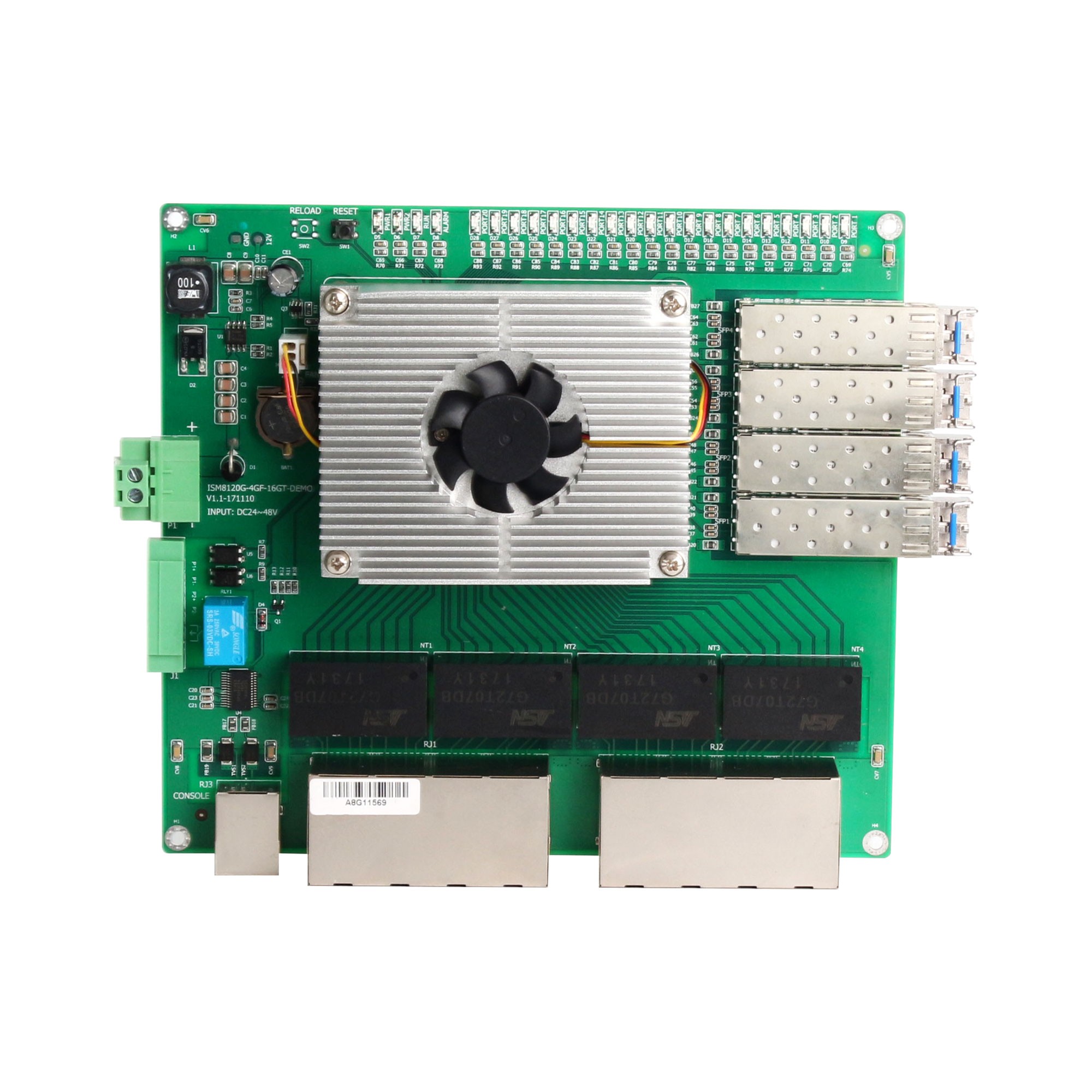Managed Switch


MES8120G-4GF-16GT Layer 3, 20-Port Switch
- 4×Gigabit fiber ports + 16×Gigabit copper ports
- Managed Embedded Industrial Switch
Features and Benefits
- Support the ring network redundancy protocols such as MW-Ring, EAPS, ERPS and STP/RSTP/MSTP to improve the network reliability
- Support static routing, RIPv1/v2, OSPF dynamic routing protocols, enabling route selection and message forwarding
- Support DC24~48V power input
- Working temperature from -40 ℃ to +70 ℃
- Overview
- Specifications
- Downloads
- Models
Product Description
MES8120G-4GF-8GT is a layer 3 Gigabit managed embedded industrial ethernet switch with 4 Gigabit SFP ports and 16 Gigabit copper ports. This switch adopts a storage and forward mechanism, with powerful bandwidth processing capabilities, automatically troubleshooting data packet errors, reducing transmission failures, and easily supporting Gigabit networking to ensure stable, reliable, and efficient data transmission. It uses industrial grade components, combined with high standard system design and production control, embedded installation method, operating at a wide temperature range of -40 ℃ to+70 ℃ to adapt to various harsh working environments.
The MES8120G-4GF-8GT follows the main communication standards in the industrial field, meeting technical requests of real-time communication and network security. It provides multiple ways to manage switches, such as accessing the switch command line (CLI) through the CONSOLE port or TELNET/SSH protocol, accessing the switch web interface through HTTP/HTTPS, and accessing the device MIB through the SNMP protocol. It supports multiple network protocols and industry standards, such as RIP, OSPF, VRRP, PIM, EAPS, ERPS, STP/RSTP/MSTP, VLAN, QoS, LACP, IGMP Snooping, GMRP, LLDP, 802.1X, ACL, DHCP, SNTP, port mirroring, Ping, Tracert, etc. It supports system management such as uploading and downloading configuration files, and upgrading image files online. The product is widely applicable in fields such as comprehensive energy, smart cities, rail transit, intelligent transportation, smart factories, and industrial automation.
Features and Benefits
- Support storm suppression for broadcast, multicast, and unknown unicast messages, detect broadcast and multicast packet storms, and prevent broadcast storms
- Support link static aggregation and dynamic aggregation LACP, which can increase transmission bandwidth, improve link reliability and realize network load balance
- Support 802.1Q VLAN, provide Access, Trunk, Hybrid interface easy to divide multiple broadcast domain, enhance the security of the network
- Support VLAN division based on port, MAC, protocol, IP subnetwork, etc., which can be applied to networks in different environments
- Support GVRP protocol, realize dynamic distribution, registration and propagation of VLAN attributes, and maintain dynamic VLAN
- Support the MAC address table and the aging time limit, and the static unicast / multicast MAC address is bound with the interface, to ensure the use of legitimate users
- Support PIM, IGMP, GMRP, IGMP Snooping multicast protocols to reduce the broadcast of multicast data in the network and save network resources
- Support LLDP link layer discovery protocol, obtains LLDP neighbor device information, monitors link status, facilitates topology management and fault localization
- Support ERPS Ethernet multi ring protection technology, provide multi ring networking, perform link backup, achieve fast convergence, and improve network stability
- Support EAPS loop protection protocol and MW-RingV2 private loop network protocol, enhance the reliability of system communication
- Support STP, RSTP, MSTP generating tree protocol, which can eliminate network loop and improve network reliability
- Support VRRP virtual routing redundancy protocol, forming multiple routing devices into a virtual router to realize redundant backup and load sharing
- Support IPv4 static routing configuration, RIPv1/v2, OSPF dynamic routing protocol, realize routing and message forwarding
- Support HTTP, HTTPS, TELNET, SSH network access mode, SSH can provide a secure remote login
- Support SNMPv1/v2c/v3, information query, information modification and troubleshooting through the MIB network management system, to achieve centralized management
- Support QoS service quality, give priority to voice, video and important data in network devices, and solve network congestion
- Support ACL access control list, filtering TCP/UDP/ICMP/IGMP messages based on source/destination IP and MAC address
- Support 802.1X port authentication, authentication and access control for access users
- Support DHCPv4 server, centralized dynamic management and configuration of user IP addresses
|
Software |
|
|
Switching |
Support port configuration, port speed limit, storm suppression, storm detection, static port trunk, LACP Support 802.1Q VLAN, port / MAC / subnet / protocol based VLAN division, GVRP, port isolation Support MAC address aging, static MAC address forwarding and filtering, MAC address binding and learning restrictions |
|
Redundancy |
Support MW-RingV2 private ring network technology Support EAPS, ERPS Support STP/RSTP/MSTP |
|
Multicast |
Support IGMP Snooping Support static multicast GMRP Support PIM-DM, PIM-SM |
|
Routing |
Support static routing Support RIPv1/ v2, OSPF dynamic routing Support VRRP |
|
Security Management |
Support HTTP, HTTPS, TELNET, and SSH access mode Support ACL and filtering data on the L2-L4 layer Support 802.1X port authentication and MAC address authentication Support loopback detection and alarm |
|
Management and Maintenance |
Support DHCP Client/Server/Relay/Snooping Support QoS, SNMP v1/v2c/v3, SNMP v1/v2c TRAP, LLDP Support port mirror, Ping, Tracert Support user rights management, system logs, local time setting synchronization, and SNTP network time synchronization Support online restart, factory reset, system upgrade, configuration file upload / download Support one master software management |
|
Switch Capability |
|
|
Processing Type |
Store-and-Forward |
|
Backplane Bandwidth |
40Gbps |
|
Buffer Size |
12Mbit |
|
MAC Table Size |
16K |
|
Interface |
|
|
Gigabit Fiber port |
4*1000Base-X Gigabit SFP ports |
|
Gigabit Copper port |
16*10/100/1000Base-T(X) auto-sensing copper ports, full/half duplex, auto MDI/MDI-X |
|
Alarm |
1 relay alarm output and 2 voltage alarm inputs, 3.81 mm pitch 6-pin terminal block |
|
CONSOLE |
1 CONSOLE port, RS232 signal RJ45 port, used for device debugging |
|
Button |
Restart and factory reset |
|
Status LED |
Power LED, operation LED, alarm LED, port LED |
|
Power Supply |
|
|
Input Voltage |
DC24~48V |
|
Power consumption |
<15W@DC24V(full load) |
|
Connection |
5.08mm pitch 2-pin terminal block |
|
Physical Characteristics |
|
|
Dimensions |
184×164×26.8(mm) |
|
Installations |
Embedded |
|
Weight |
About 0.47kg |
|
Working Environment |
|
|
Operating Temp |
-40℃~+70℃ |
|
Storage Temp |
-40℃~+85℃ |
|
Relative Humidity |
5%~95% (non-condensing) |
NAME |
VERSION |
download |
|---|---|---|
|
V1.1 |
|
Standard Model |
Gigabit SFP port |
Gigabit Copper port |
Input Voltage |
|
MES8120G-4GF-16GT |
4 |
16 |
DC24~48V |
- Products
- Ethernet Switch
- PoE Switch
- Media Converter
- Serial Device Server
- Industrial Gateway
- Fieldbus Converter
- WLAN
- Cellular
- Contact
-
 +86 27 87170217
+86 27 87170217
 No.52, Liufang Road, East Lake Hi-tech Development Zone, Wuhan, China
No.52, Liufang Road, East Lake Hi-tech Development Zone, Wuhan, China






















